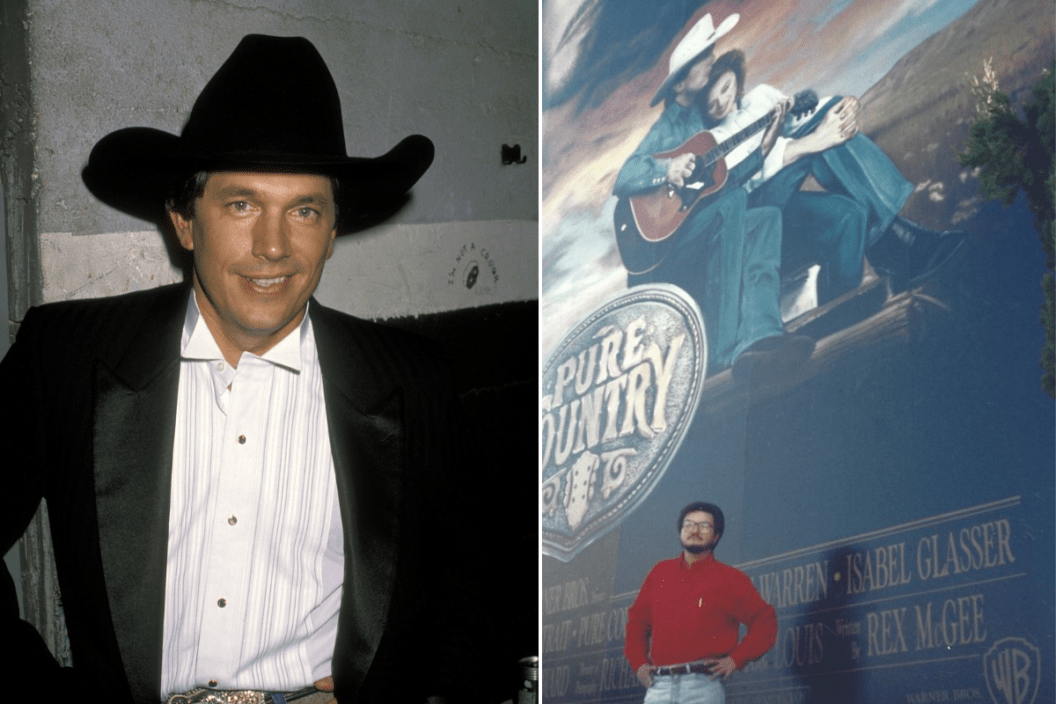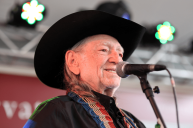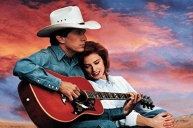Over 30 years ago, Rex McGee was assigned a difficult task— write 1992's Pure Country, a feature-length drama designed to boost the career of a country superstar with zero acting experience.
"I was hired to write a movie for George Strait," McGee told Wide Open Country. "Jerry Weintraub, who was the producer of Pure Country, had a deal at Warner Bros., and he was the protege of Elvis' manager, Col. Tom Parker. Col. Parker was the one who suggested to Jerry that he should put George in the movies like [Parker did for Presley]. It took a while to convince George because he did not want to be an actor and he is not demonstrative on stage. He gets up there and sings, and that's about it. He doesn't jump around like Garth Brooks does."
McGee was a good fit to pen the tale of Strait's character, Wyatt "Dusty" Chandler. After being raised near filming locations around Fort Worth, Texas, the lifelong movie buff relocated to Hollywood to study film at USC. Though he didn't follow country music closely in the late '80s and early '90s, McGee had sung onstage at age 5 with the legendary Hank Thompson, and the veteran writer cites Jerry Reed as an all-time favorite artist. When tasked with writing Pure Country, McGee was once again living in the Dallas-Forth Worth area, where he got a feel for Strait's past by immersing himself in the region's rodeo culture.
"My only instructions from the producer was it's got to have 10 songs in it because they were going to put out an album and somewhere in the movie, George has to rope something because he's a rodeo guy and team roper and loves doing that," McGee added.
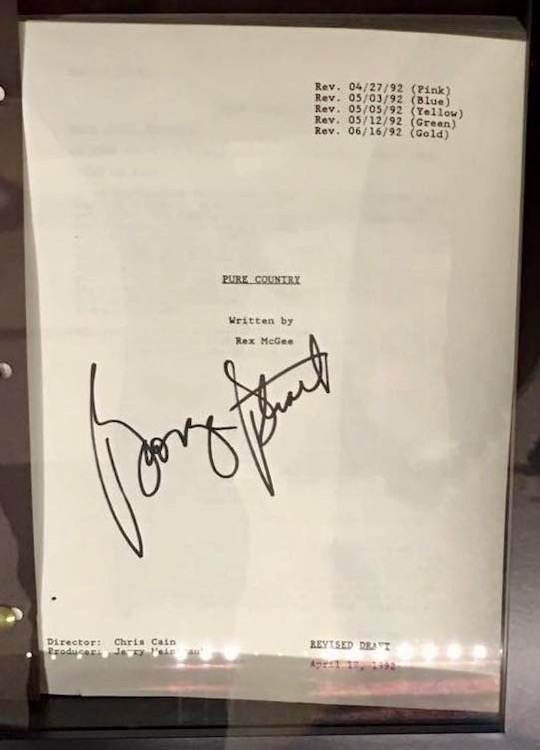
Courtesy of Rex McGee
Inspiration for Strait's character not feeling comfortable in his own skin came from a different king.
"I guess I was thinking about [Elvis Presley] at the time because of the connections with Weintraub and Parker and all that," McGee explained. "I was thinking, 'What would've happened if Elvis had changed his appearance and disappeared from all the yes men and all the Memphis Mafia and went back to his original music? His original gospel and rhythm and blues, you know? If Elvis had done that, would he still be alive?' That got me thinking about where the story is, and it's about a guy who's totally unfulfilled about his stardom, his money, his position."
While writing a script for one music icon that was inspired by another, McGee created something that's been universally relatable to viewers for over 30 years.
"It's a midlife crisis story in a way, and I think everybody kind of hits that place in their mid 40s or 50s or whenever its strikes," he added. "'Is this all there is? I'm successful, I've got money, I've got a family, I've got a business but I'm not happy. I'm not fulfilled.' I think that's what touches people and it's the secret to [the film's] staying power. I can't think of anybody who hasn't had that moment in their lives."
There's an added personal touch from McGee hiding in the first script he wrote that got made into a film.
"There is a scene where George's character goes to this old cemetery, and he goes to the headstone of his parents who apparently had died," he said. "It's a phony headstone they made for the movie. On that headstone was the names of my parents, who were both deceased at the time. The first time I saw that, I wept like a baby. It was my thank you to them. I almost can't watch that shot. My dad's name was Theo and my mother's name was Lucille, and those are the names on the headstone."
Such thought and care about the story and its deeper meaning helped ease the burden on Strait as a first-time actor.
"I thought, 'Okay, if I'm going to write a script for an actor that can't act, that won't work. I've got to write it like I'm writing it for Lawrence Olivier'," McGee said. "So, write the best you can, and that's what I did. George was awkward at times, but Christopher Cain, the director, helped him through it. I remember [Strait's] son Bubba, who was 8 or 9 at the time, giving him acting lessons."
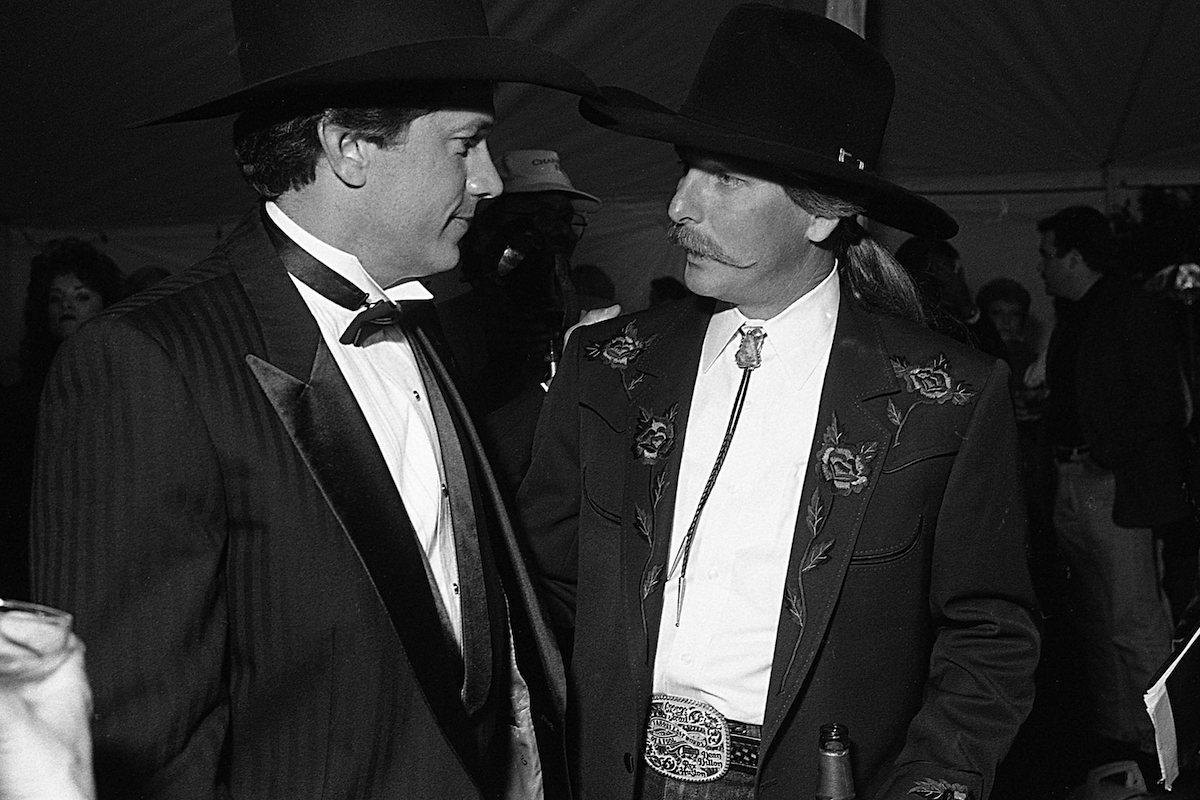
NASHVILLE - OCTOBER 20: Country Music Singer George Strait with Country Music Songwriter Dean Dillon at Party for George Strait Movie premiere on October 20, 1992 in Nashville, Tennessee (photo by Beth Gwinn/Getty Images)
Pure Country disappointed at the box office upon its release, earning around $15 million off a budget of $10 million. However, the film became a long-term success for two reasons. One, it gradually won over an audience via cable television. More importantly for Strait, the Pure Country soundtrack album became the best-selling full-length of his career, with "I Cross My Heart" and "Heartland" being among his 60 career No. 1 hits.
Enough momentum grew away from theaters for Pure Country to be viewed as a title that'd drum up fan interest in two otherwise unrelated films.
"Warner Bros. owns the title Pure Country, so that slapped that on— Pure Country 2: the Gift. That was a script that was floating around for a long, long time that was about a girl singer," McGee said. "There's another one [Pure Country: Pure Heart] with Willie Nelson. I guess it's a complement that they put that name on them."
In recent years, McGee has retooled Pure Country into a musical featuring new songs by "Heartland" co-writers Steve Dorff and John Bettis.
"It was part of my screenwriting contract that in two years after its release, if Warner Bros. had not developed it into a musical, those rights would revert to me," McGee explained. "So, it turns out that I owned the musical stage rights to the story."
The project allowed McGee to revisit scenes absent from the film while increasing focus on his story's romantic subplot.
"A lot of what I thought were important scenes were cut out," he said. "I saw them shot because I was there, so I knew they were cut out. I wanted those scenes back. I wanted to make it better."
McGee did some cuts of his own. Namely the required roping-and-riding scene because, as he put it, "It's hard to do barrel racing on the stage."
As for additional tweaks, the Dusty character's identity and destiny are more closely tied to his hometown.
"I changed the plot somewhat where the girl that he meets in the musical is the girl he left behind when Lula the manager discovers him in a honky-tonk in small-town Texas," McGee said. "In the movie, he meets the girl and then the romance forms. When he goes back in the musical, he had left her behind, and she was very upset with him. So I had a romantic conflict going.
"I didn't think the musical should end in Las Vegas because it was a story of homecoming," he continued. "It was about how he found his roots again, and his roots were not in Las Vegas. I wanted to end the show with him leaving his star-driven life and going back to the honky-tonk at home where he started."
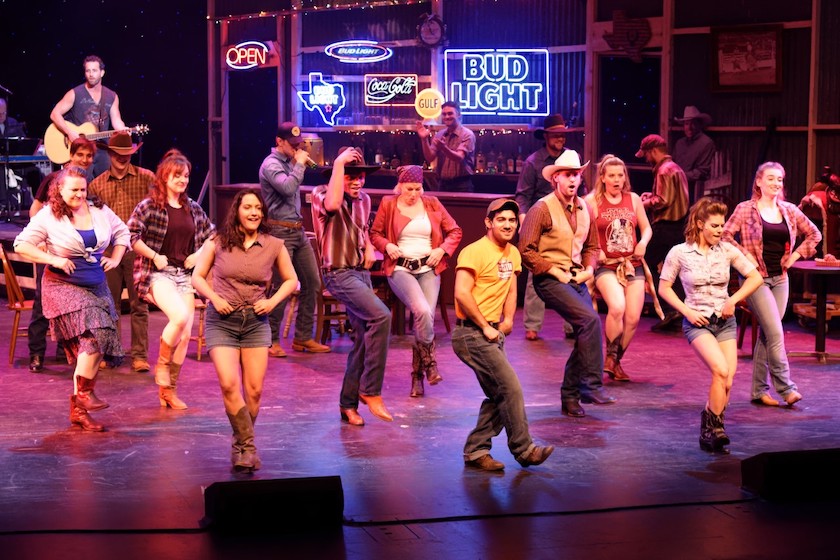
Courtesy of Rex McGee
Theater tastemakers in New York shunned the project, in part because the stage version of Urban Cowboy's poor performance hurt the reputation of country movies-turned-musicals. McGee wasn't deterred, looking elsewhere for support after considering the film's marketing strategy.
"I remember Jerry Weintraub saying, 'I don't care if this movie ever plays New York or L.A. That's not the audience we're looking for. We're looking for the Heartland audience here'," he said. "He was right, and that's where it's still popular."
Thus, the play found a home in Texas. It got its first full production in 2017 in Dallas, with another run set to go in Houston right before the COVID-19 lockdown.
McGee and his team are now looking for other options in markets that may prove Weintraub as a stage show soothsayer.
